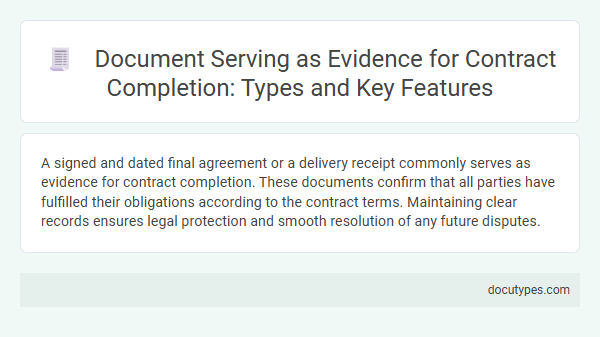A signed and dated final agreement or a delivery receipt commonly serves as evidence for contract completion. These documents confirm that all parties have fulfilled their obligations according to the contract terms. Maintaining clear records ensures legal protection and smooth resolution of any future disputes.
Introduction to Contract Completion Evidence Documents
Evidence of contract completion is essential to confirm that all terms and obligations have been fulfilled by the involved parties. Common documents serving this purpose include completion certificates, final invoices, and acceptance letters. These documents provide formal verification and protect both parties by documenting the successful conclusion of contractual duties.
Importance of Documenting Contract Fulfillment
The type of document that serves as evidence for contract completion is typically a Completion Certificate or a Final Acceptance Document. These documents confirm that all contractual obligations have been met according to agreed terms.
Documenting contract fulfillment is crucial for legal protection and dispute resolution. It provides clear proof that the work is done and accepted, preventing potential conflicts. You ensure accountability and transparency by maintaining accurate records of contract completion.
Common Types of Evidence Documents in Contracts
Common types of evidence documents for contract completion include delivery receipts, acceptance certificates, and final invoices. Delivery receipts confirm the transfer of goods or services to the client, proving fulfillment of contract terms. Acceptance certificates are formal acknowledgments by the client that the work meets contract specifications, while final invoices document the financial closure of the contract obligations.
Completion Certificates: Definition and Key Elements
| Document Type | Completion Certificate |
|---|---|
| Definition | A Completion Certificate is an official document issued by a project owner or contract administrator confirming that all contractual obligations have been fulfilled and the project or work has been completed as per the agreed terms. |
| Purpose | Serves as evidence that the contractor has completed the work according to specifications, marking the formal end of contract performance. |
| Key Elements |
|
| Legal Significance | The Completion Certificate acts as binding proof for contract closure and can influence final payments, release of retention sums, and dispute resolution. |
Delivery Receipts as Proof of Contract Performance
Delivery receipts serve as vital evidence for contract completion by confirming that goods or services have been delivered as agreed. These documents record specific details such as delivery date, recipient's signature, and items or services provided.
Proof of contract performance through delivery receipts helps resolve disputes by providing clear, objective verification of fulfillment. Maintaining accurate delivery receipts supports legal compliance and strengthens contractual accountability.
Inspection Reports for Contract Closeout
Inspection reports serve as critical evidence for contract completion by documenting the condition and performance of deliverables. These reports verify that all contract requirements have been met according to specified standards.
Your approval of the inspection report signals formal acceptance and initiates the contract closeout process. Detailed findings within the report support transparent communication between parties and reduce disputes related to contract fulfillment.
Acceptance Letters and Their Legal Implications
Acceptance letters serve as key evidence for contract completion by formally acknowledging the fulfillment of contractual obligations. These documents carry significant legal weight in confirming that all parties have agreed to the terms and completed required duties.
- Formal Acknowledgment - Acceptance letters provide written proof that the recipient agrees the contract terms have been satisfactorily met.
- Legal Evidence - Courts often consider acceptance letters as binding confirmation of contract completion in disputes.
- Record of Performance - These letters document that the obligations under the contract have been delivered and accepted.
Key Features of Valid Evidence Documents
Documents that serve as evidence for contract completion must clearly demonstrate fulfillment of all agreed terms. Your ability to provide valid evidence ensures legal recognition of contract closure.
- Clear Identification - The document must explicitly reference the contract and involved parties to confirm its relevance.
- Signatures and Dates - Authorized signatures and precise dates validate the timing and approval of contract completion.
- Detailed Performance Description - Comprehensive details outlining completed obligations verify that contractual duties are satisfied.
Digital vs. Physical Documents in Contract Completion
What type of document serves as evidence for contract completion? Digital documents like signed PDFs and electronic receipts provide quick and verifiable proof of contract fulfillment. Physical documents such as stamped completion certificates or original signed agreements remain crucial for legal validation in many jurisdictions.
What Type of Document Serves as Evidence for Contract Completion? Infographic

